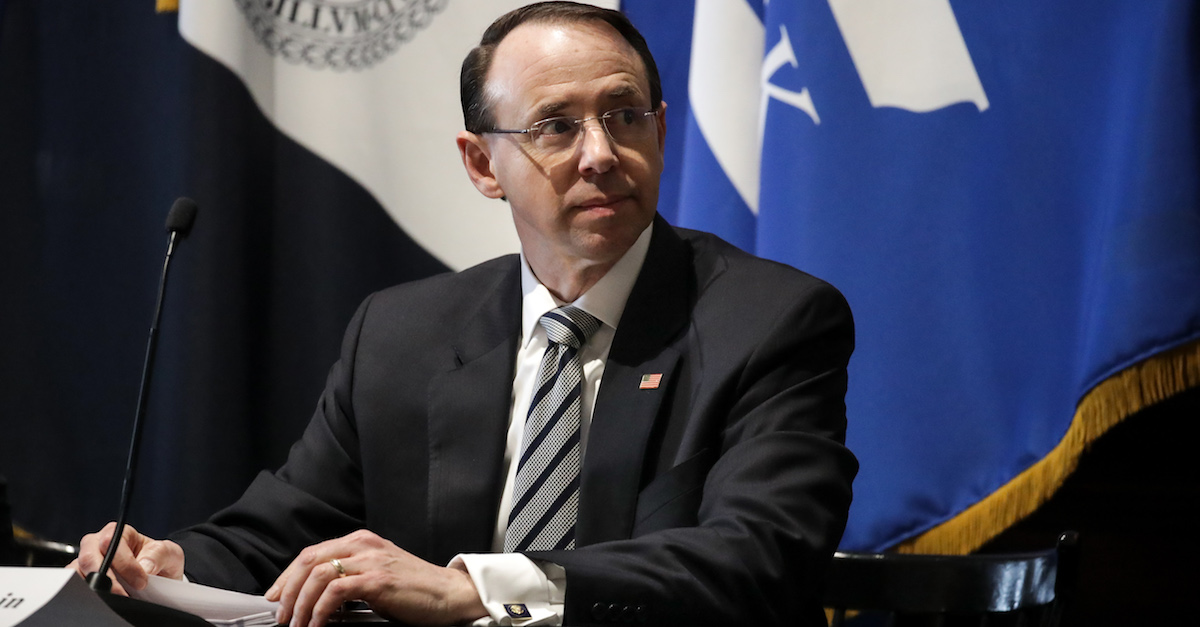
The New York Times dropped another bombshell story on Friday afternoon, alleging that Deputy Attorney General Rod Rosenstein offered to wear a “wire” and secretly record President Donald Trump.
While many of the attacks leveled at Rosenstein have been bitterly partisan, the timeline of these reported events does raise some questions about the appointment of Robert Mueller as special counsel.
Robert Mueller was appointed by Rosenstein as special counsel on May 17, 2017. Before that occurred, Attorney General Jeff Sessions chose to recuse himself from the Russia investigation on March 2, meaning that Rosenstein was next in line.
While Rosenstein was still getting acclimated to this high-pressure responsibility, then-FBI Director James Comey was fired by President Trump. Comey was fired on May 9, 2017.
This is where the New York Times story comes in.
Mr. Rosenstein made these suggestions in the spring of 2017 when Mr. Trump’s firing of James B. Comey as F.B.I. director plunged the White House into turmoil. Over the ensuing days, the president divulged classified intelligence to Russians in the Oval Office, and revelations emerged that Mr. Trump had asked Mr. Comey to pledge loyalty and end an investigation into a senior aide.
Mr. Rosenstein was just two weeks into his job. He had begun overseeing the Russia investigation and played a key role in the president’s dismissal of Mr. Comey by writing a memo critical of his handling of the Hillary Clinton email investigation. But Mr. Rosenstein was caught off guard when Mr. Trump cited the memo in the firing, and he began telling people that he feared he had been used.
Spring? Check. 2017? Check. Two weeks in on his new job? Check. He was upset that Trump cited his memo to justify a Comey firing and reacted? That’s what the New York Times appears to be suggesting.
As Law&Crime’s Alberto Luperon reported earlier, sources who were privy to briefings at the FBI said that they heard that Rosenstein seriously suggest wearing a recording device (a “wire”) while he had conversations with president. Rosenstein also discussed, those sources said, that he discussed getting cabinet memebers to remove Trump from office through the 25th Amendment.
These sources cited, in part, fired FBI Deputy Director Andrew McCabe‘s memos on Rosenstein’s comments.
Rosenstein and a Department of Justice spokeswoman responded to the Times report. Here’s what Rosenstein said:
The New York Times’s story is inaccurate and factually incorrect. I will not further comment on a story based on anonymous sources who are obviously biased against the department and are advancing their own personal agenda. But let me be clear about this: Based on my personal dealings with the president, there is no basis to invoke the 25th Amendment.
Notice that Rosenstein said there is “no basis to invoke the 25th Amendment” — based only on his interactions with the president. This says nothing of others’ dealings with Trump.
That aside, the unnamed DOJ spokeswoman who also commented confirmed that Rosenstein did say the “wire” remark, but claimed it was uttered sarcastically. This was disputed by the sources who were discussing Rosentein’s remarks. They believed he was serious about the idea and said he suggested FBI officials could also secretly record the president.
NBC News is reporting that the remark was sarcastic.
The Washington Post is pushing back on that, too. McCabe’s memos appear to have something else to say. Per the Post:
While McCabe’s memos assert both the recording and 25th amendment conversations occurred at a meeting within days of Comey’s firing, another person at the meeting, speaking on condition of anonymity to discuss internal deliberations, insisted the recording comment was said in a moment of sarcasm, and that the 25th amendment was not discussed.
That person said the wire comment came in response to McCabe’s own pushing for the Justice Department to open an investigation into the president. To that, Rosenstein responded with what this person described as a sarcastic comment along the lines of, “What do you want to do, Andy, wire the president?”
That person insisted the statement was never discussed with any intention of recording a conversation with the president.
Lisa Page — yes, that Lisa Page — reportedly didn’t mention discussion about the 25th Amendment in her notes. A third person said that McCabe previously made the assertions about Rosenstein in private.
As Mediaite noted, McCabe did not deny the Times report in a statement Friday afternoon.
We would be remiss if we did not mention that the Office of the Inspector General (OIG) said that McCabe “lacked candor” — “knowingly provided false information in a verbal or written statement” or “lied” — on multiple occasions.
Whatever the truth of this is, those who have maintained that there’s something shady about the origins of the Mueller investigation will certainly rejoice over the news. Legal observers agree that Trump, already the leading critic of all things Mueller Probe and “witch hunt,” certainly has more ammunition after the Times story than he did before it.
https://twitter.com/AndyGrewal/status/1043202100656779264
Others, on the other hand, believe that the Times was “set up” to publish something Trump would later use to justify a Rosenstein firing, and to “derail” the Mueller probe.
https://twitter.com/Dave_Canseco/status/1043197298438635520
https://twitter.com/hierroyluz/status/1043207714405412864
https://twitter.com/MatthewWords/status/1043200201559818240
[Image via Drew Angerer/Getty Images]
This is an opinion piece. The views expressed in this article are those of just the author.